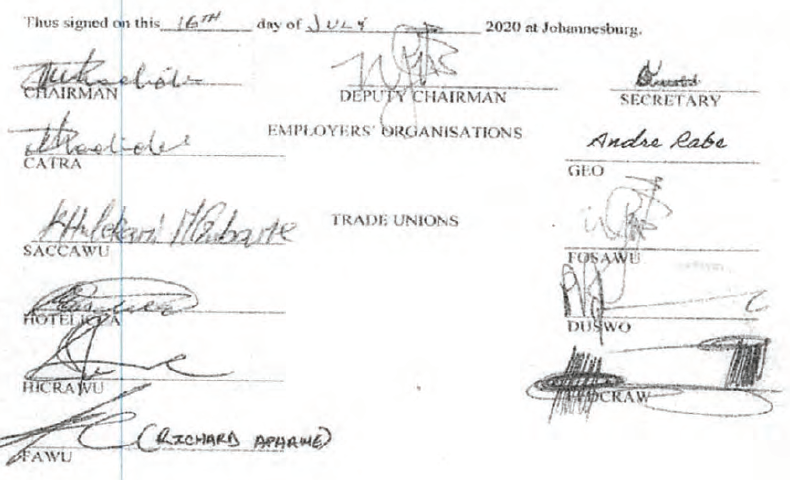| 1. | The purpose of this code is to: |
| 1.1 | Assist in maintaining the good repute of the process regarding disputes and in particular the office of the Council. |
| 1.2 | Provide guidance to all commissioners on matters of professional conduct and practice generally. |
| 2. | GENERAL ATTRIBUTES OF COMMISSIONER(S) |
In order for all dispute processes to be seen to be fair, just and gain confidence of the public, Commissioners shall:
| 2.1 | Act with honesty, impartiality, due diligence and independent of any outside pressure in the discharge of their Bargaining functions; |
| 2.2 | Conduct themselves in a manner that is fair to all parties and shall not be swayed by fear of criticism or by self-interest; |
| 2.3 | Not solicit appointment for themselves. This shall not however preclude commissioners from indicating a willingness to serve in any capacity; |
| 2.4 | Accept appointment only if they believe that they are available to conduct the process promptly and are competent to undertake the assignment; |
| 2.5 | Avoid entering into any financial, business or social relationship which is likely to affect their impartially or which might reasonably create a perception or partiality or bias; |
| 2.6 | Not influence Council officials or employees by improper means, including gifts or other inducements. |
| 3. | CONFLICT OF INTEREST AND DISCLOSURE |
| 3.1 | Commissioners should disclose any interest or relationship that is likely to affect their impartiality or which might create a perception of partiality. The duty to disclose rests on the Commissioner. |
| 3.2 | Commissioners appointed to intervene in any matter should before accepting disclose: |
| (a) | any direct or indirect financial or personal interest in the matter; |
| (b) | any existing or part financial, business, professional, family or social relationship which is likely to affect impartiality or may lead to a reasonable perception of partiality or bias; |
| (c) | if the circumstances requiring disclosure are unknown to commissioners prior to accepting appointments, disclosure must be made when such circumstances become known to the Commissioners. The disclosure in this regard could in arbitration proceedings, include witnesses who may have a relationship with the Commissioner; |
| (d) | after appropriate disclosure Commissioners may serve if both parties so desire but should withdraw if they believe that a conflict of interest exists irrespective of the view expressed by the parties; |
| (e) | in the event where there is no consensus on whether Commissioners should withdraw or not, Commissioners should not withdraw if the following circumstances exist: |
| (i) | if the terms of reference provide for a procedure to be followed for determining challenges to the Commissioners then those procedures should be followed; |
| (ii) | if Commissioners after carefully considering the matter, determine that the reason for the challenge is not substantial and that they can nevertheless act impartially and fairly, and that the withdrawal would cause unfair delay or would be contrary to the ends of justice. |
| 4.1 | Commissioners should conduct proceedings fairly, diligently and in an even handed manner. |
| 4.2 | Commissioners should have no casual contact with any of the parties or their representatives while handling a matter without the presence or consent of the other. |
| 4.3 | Commissioners should be patient and courteous to the parties and their representatives or witnesses and should encourage similar behaviour by all parties participating in the proceedings. |
| 4.4 | A Commissioner must be satisfied before proceeding ex parte that a party refusing or failing to attend the hearing has been given adequate notice of the time, place and purpose of the hearing. |
| 5.1 | Information disclosed to commissioners in confidence by a party during the course of conciliation, should be kept by Commissioners in the strictest confidence and should not be disclosed to the other parts or to third parties unless authority is obtained of such disclosure. |
A direct settlement by the parties of some or all issues in a case, at any stage of the proceedings, must be accepted by Commissioners as relieving him or her of further jurisdiction in respect of such issues.
| 7.1 | Commissioners have the duty to plan their work schedules in a manner that ensures that commitments to the Council are fulfilled timeously. |
| 7.2 | Commissioners should co-operate with the parties and the Council to avoid delays. |
| 8.1 | Commissioners should decline appointment, withdraw or request technical assistance when they decide that a matter is beyond their competence. |
| 8.2 | Commissioners should understand the issues which form part of the dispute before endeavouring to assist the parties with the settlement of that dispute. In this regard, commissioners should spend time at the beginning of the proceedings to make sure that the understand the positions, the needs and expectations of the parties. |
| 9. | BASIS OF CONCILIATION PROCEEDINGS |
| 9.1 | Commissioners acting as conciliators should determine at the commencement of a matter whether the proceedings will take place on a "without prejudice" basis and should secure the agreement of the parties in this regard. |
| 10. | DISCIPLINARY PROCEDURE |
| 10.1 | The Councils Executive Committee may conduct a disciplinary enquiry in the event of:— |
| (a) | A Commissioner is alleged to have failed and/or refused to comply with the Council's code of conduct; |
| (i) | is found to be incapable of performing the duties of a Commissioner; |
| (ii) | is alleged to have been guilty of serious misconduct; |
| (b) | If found guilty the Council may: |
| (i) | suspend a Commissioner from acting as a Commissioner; |
| (ii) | remove him/her from the panel of Commissioners. |




